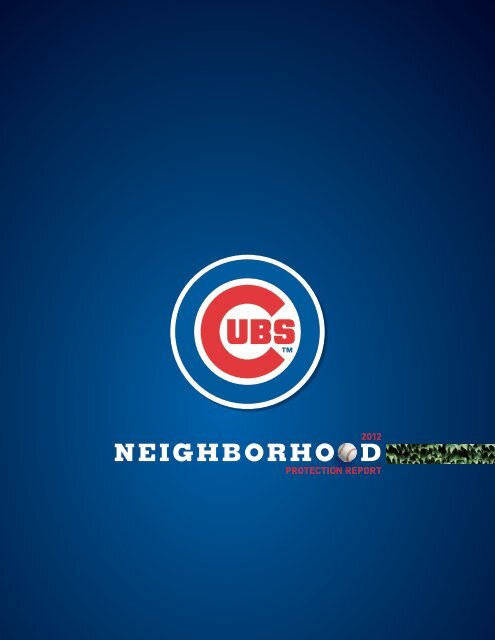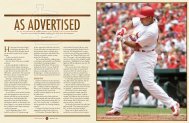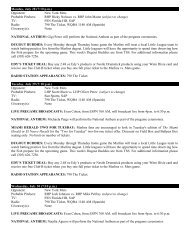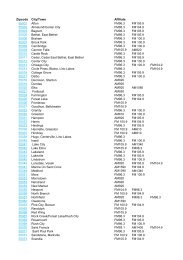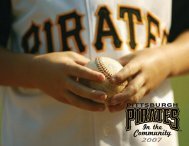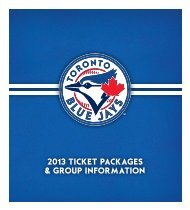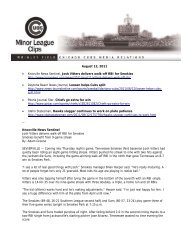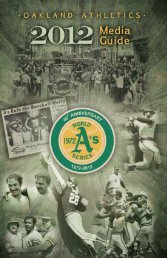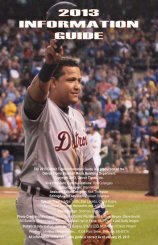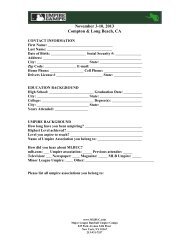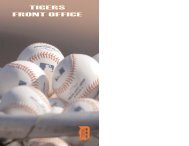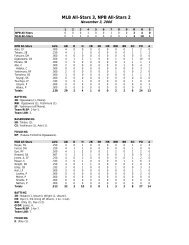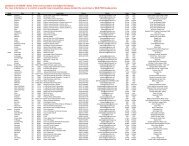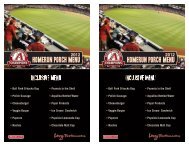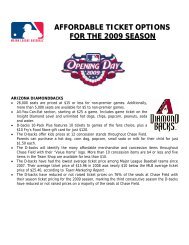2012 - MLB.com
2012 - MLB.com
2012 - MLB.com
You also want an ePaper? Increase the reach of your titles
YUMPU automatically turns print PDFs into web optimized ePapers that Google loves.
<strong>2012</strong><br />
NEIGHBORHOOD<br />
protection report
Dear neighbors:<br />
Thank you for your support of the Chicago Cubs in <strong>2012</strong>. Each year, we are proud to share with<br />
the <strong>com</strong>munity our efforts aimed at protecting and enhancing the quality of life for Lakeview<br />
residents, while ensuring the fan and visitor experience at Wrigley Field is the best in baseball.<br />
We kept this <strong>com</strong>mitment in <strong>2012</strong>. Through our annual investment of more than $750,000, we<br />
reduced traffic congestion in the area, proactively <strong>com</strong>municated to residents about events and<br />
activities in the neighborhood and helped keep our <strong>com</strong>munity clean and safe.<br />
Our notable achievements in <strong>2012</strong> are highlighted below:<br />
• More than 40,000 fans took the free shuttle bus to Wrigley Field from the remote<br />
parking lot at DeVry University, helping alleviate traffic in the neighborhood.<br />
• More than 5,000 bicyclists took advantage of the free valet service during the season,<br />
further reducing traffic and air pollution in the area.<br />
• Our neighborhood newsletter reached more than 8,000 subscribers with regular<br />
updates about events inside and outside the ballpark, including impacts to parking and<br />
traffic in the area.<br />
We continued our support of CubFund, a $1 million, 12-year <strong>com</strong>mitment to fund unanticipated<br />
neighborhood protection and improvements for matters related to Cubs baseball games and<br />
other events at Wrigley Field.<br />
We are also proud of our investments in the <strong>com</strong>munity. In <strong>2012</strong>, the Chicago Cubs provided<br />
charitable grants of more than $2.3 million to deserving area non-profit organizations.<br />
The team also donated <strong>com</strong>plimentary tickets to more than 500 <strong>com</strong>munity and social service<br />
organizations throughout the year.<br />
We continue to actively participate in the <strong>com</strong>munity, working hard to improve the quality of life<br />
in our neighborhood.<br />
Thank you for your help along the way. We look forward to working together again in 2013.<br />
Chicago Cubs Community Affairs
<strong>2012</strong><br />
protection report<br />
REmOtE PaRkING OPERatION<br />
In the nine years since the Cubs assumed operation of the remote parking lot at DeVry<br />
University at the request of the City of Chicago, the parking lot has continually experienced<br />
success. During the <strong>2012</strong> season, which included 53 night and weekend games and four<br />
concert dates, more than 15,000 cars parked at DeVry University and more than 40,000 fans<br />
rode the free shuttle bus to Wrigley Field.<br />
Every car using the remote parking facility helps reduce traffic congestion around Wrigley<br />
Field. This season, the remote parking lot was operational for 53 dates, including every Cubs<br />
night and weekend game during the season and four musical performances.<br />
Highlights of the year include:<br />
• Total cars parked: 15,000+.<br />
• Total fans using the lot: 40,000+.<br />
• Average number of cars per event for all games (regular season): 293<br />
• Largest single game usage: 480 cars.<br />
The Cubs created television and radio advertising for the remote parking facility to help<br />
encourage its use. The advertising highlighted its convenient location and affordability. Cubs<br />
season ticket holders and online purchasers were sent information with their ticket orders<br />
before the <strong>2012</strong> season began. Fans could also download information about the remote facility<br />
from the Cubs website, www.cubs.<strong>com</strong>. Brochures explaining the shuttle bus and other<br />
transportation options were distributed by hotels in and around the Chicago area. Transportation<br />
alternatives were also suggested on the back of season parking and daily sale coupons for all<br />
Cubs parking lots.<br />
The team and the City worked together to continue use of the electronic message boards on<br />
Western Avenue, Irving Park Road and Addison Street, near Rockwell Street to promote the<br />
remote parking facility. These signs were in place for all night and weekend games at locations<br />
adjacent to City streets. Static signage on many streets in the area, as well as on the Edens and<br />
Kennedy expressways, further helped direct cars to the lot.<br />
BIkE CHECk SERvICE<br />
In <strong>2012</strong>, the Chicago Cubs once again offered a popular free bicycle check service from a valet<br />
location on Waveland Avenue near Gate K. The bike check operated throughout the regular<br />
season and continued for all event dates at Wrigley Field, including musical performances.<br />
Bike service began three hours before the scheduled event time and ended one hour after the<br />
conclusion of the event. More than 5,000 bikes used the free service during the regular<br />
baseball season.<br />
This free bike check service continues to host a regular clientele of riders and continues to be<br />
a major contributor to reductions in vehicular traffic in the <strong>com</strong>munity. In addition to the Cubs’<br />
official bicycle check service area, hundreds of fans locked their bikes to one of the many bicycle<br />
racks around the park. Many Cubs employees and vendors serving the ballpark also used the<br />
bike valet service.<br />
3
<strong>2012</strong><br />
protection report<br />
tRaffIC maNaGEmENt autHORIty<br />
The Office of Emergency Management and Communication’s Traffic Management Authority was<br />
again instrumental in working with the Cubs and the <strong>com</strong>munity to reduce traffic congestion<br />
and coordinate traffic flow during events. The flexibility of TMA personnel is key to addressing<br />
shifting traffic needs. The number of TMA personnel increased or decreased as attendance<br />
varied and traffic patterns changed. Typically 48-49 traffic aides are posted in the streets around<br />
Wrigley Field to control vehicular traffic for event dates. The Cubs reimburse the City of Chicago<br />
for the cost of TMA traffic aides. In <strong>2012</strong>, the total payment through June was $261,000 with a<br />
projected yearly total of $560,000.<br />
The following traffic pattern ideas have been offered by neighbors and businesses during the<br />
course of the season. Each should be evaluated as a way to determine best practices to address<br />
Cubs-related traffic around Wrigley Field:<br />
• Stop traffic on Sheffield Avenue for all games beginning when ballpark gates open two<br />
hours prior to game time.<br />
• Stop northbound traffic on Racine Avenue (from Addison Street to Grace Street) for 30<br />
minutes after each game. Objective: Help keep northbound Clark Street clear for bus<br />
traffic.<br />
• Night games — Coordinate traffic signals on Irving Park Road westbound to Western<br />
Avenue after games. Objective: Keep westbound Irving Park Road available for cars<br />
headed to the expressway.<br />
• Night games and weekend games — Facilitate a bus lane on northbound Clark Street<br />
from Waveland Avenue to Irving Park Road. Objective: Smooth post-game traffic flow.<br />
• Stoplights at the intersection of Clark Street with both School and Roscoe Streets to<br />
replace the stop signs.<br />
The City of Chicago implemented an offset centerline on westbound Irving Park Road between<br />
Clark Street and Ashland Avenue. The new striping allows two lanes of westbound traffic at all<br />
times and should help facilitate traffic exiting the area after ballpark events. The Cubs supported<br />
this effort. The two westbound lanes are an asset to traffic operations.<br />
PROmOtION Of altERNatE<br />
tRaNSPORtatION<br />
The Chicago Cubs continue to use valuable television and radio broadcast time and print<br />
advertising to promote public transportation and alternate means of getting to the ballpark,<br />
including CTA, Pace, the remote parking lot at DeVry University and the bike valet operation.<br />
Brochures mentioning these services have been printed and distributed for the past eight years.<br />
the following assisted with traffic issues in <strong>2012</strong>, promoting alternate means of transportation<br />
and other ways to reach the Friendly confines:<br />
• In-game announcements during Cubs television and radio broadcasts.<br />
• Promotion of CTA service on Wrigley Field scoreboard.<br />
• In-park announcements during games.<br />
• Detailed information available at all times on www.cubs.<strong>com</strong>.<br />
4
<strong>2012</strong><br />
PERmItS<br />
protection report<br />
Printing costs for the Neighborhood Night Game Parking Permit stickers, guest vehicle placards<br />
(Single Game and All Game Placards) and Access Passes in LV-2 zones are the responsibility of<br />
the Chicago Cubs.<br />
CHICaGO tRaNSIt autHORIty<br />
Fan surveys during the <strong>2012</strong> season found significant numbers of Cubs fans took CTA and other<br />
forms of public transportation. Additional rail service was provided for weeknight Cubs games<br />
via Purple Line Express trains, which stop at Sheridan located one block north of Wrigley Field;<br />
and Yellow Line trains, which operate two hours later than the regular schedule from Howard.<br />
Cubs fans can also access detailed information published in the Cubs monthly magazine, Vine<br />
Line and the Cubs Yearbook. Information was also provided to season ticket holders and other<br />
ticket purchasers.<br />
Fans can also access Wrigley Field from several CTA bus routes, including #8 Halsted, #22<br />
Clark and #152 Addison. Season ticket holders, as well as online purchasers, were sent<br />
information about public transportation with their ticket orders before the <strong>2012</strong> season began.<br />
Transportation alternatives were suggested on the back of daily parking coupons for all Cubs<br />
parking lots. Information on public transportation and remote parking at DeVry was also placed<br />
in all Cubs game-day programs.<br />
PaCE<br />
Use of the Pace bus program was very strong during the <strong>2012</strong> season. In part, this was due to the<br />
promotion on radio broadcasts and within Wrigley Field. Pace operated its Schaumburg shuttle<br />
from the Northwest Transportation Center and a non-stop shuttle service from the Yorktown<br />
Shopping Center in Lombard, Illinois. Up to six buses are staged on Clark Street and ready for<br />
the return trip one half hour after the last out of the game. The service is well-received by Pace<br />
users and offers a convenient way to get to Wrigley Field from the western suburbs on most<br />
game days, and all night and weekend games. In <strong>2012</strong>, the ridership on the Wrigley Field Express<br />
from Schaumburg was 22,711, and ridership from Lombard was 11,491 for a <strong>com</strong>bined total of<br />
34,202 Pace riders.<br />
5
<strong>2012</strong><br />
protection report<br />
lIttER, tRaSH REmOval<br />
Among the efforts undertaken by the cubs in <strong>2012</strong>:<br />
• Picked up trash after games and the following mornings.<br />
• Emptied trash bins around the park during games.<br />
• Power-washed sidewalks immediately adjacent to Wrigley Field (north side of Addison<br />
Street, west side of Sheffield Avenue, south side of Waveland Avenue, east side of Clark<br />
Street) at least once per homestand.<br />
• Made in-park announcements during each game (e.g., throw away trash in bins before<br />
leaving the park and throw trash only in bins outside of the park).<br />
• Stationed trash bins and personnel at exits to ask people to deposit trash, non-souvenir<br />
cups, wrappers, etc. in bins before exiting the park.<br />
• Posted signs to remind fans to throw away trash in bins before exiting the park and<br />
throw away trash in bins outside the park. Cleaned area bounded by Clark Street,<br />
Sheffield Avenue and Waveland Avenue. This included emptying garbage bins on<br />
opposite sides of the street.<br />
• Emptied public trash bins every Saturday, after each event and on holiday weekends and<br />
designated holidays when City service was lessened and garbage increased, even when<br />
unrelated to Cubs games.<br />
• Emptied public and Cubs-owned or -placed trash bins at corners or locations in the area<br />
bounded by Halsted Street, Montrose Avenue, Damen Avenue and Belmont Avenue, and<br />
in the area bounded by Kenmore Avenue adjacent to Challenger Park and Kelly Park and<br />
Seminary Avenue adjacent to Kelly Park after night games, and in all Cubs (or affiliate)<br />
owned-or-operated Wrigley Field parking lots on all game days (typically three hours<br />
after a game).<br />
• Cleaned and swept streets near the park, including Sheffield, Wilton, Fremont, Grace,<br />
Waveland, Racine, Seminary, Kenmore, Clifton, Alta Vista, Byron, Patterson, Eddy<br />
and Cornelia.<br />
• Hand-cleaned neighborhood on Saturdays when the team was away.<br />
• Offered a recycling program around the exterior of the ballpark.<br />
• Neighborhood clean-up and trash removal was performed after each game or event<br />
by the Cubs.<br />
GamE tImES<br />
After each game, Cubs operations crews began their work<br />
approximately three to four hours after the game ended. The crews<br />
worked three zones dressed in bright shirts identifying them as<br />
“Cubs Night Crew.” Each group had a blue dumpster with Cubs logo<br />
to help further identify them. The Cubs hired Allied Waste, Inc., to<br />
empty public trash bins and additional cans in an area of approximately<br />
a two square mile boundary. Halsted, Belmont, Ashland and Montrose are<br />
the boundary area. This area contained approximately 215 trash containers;<br />
all were emptied after each game as well as selected non-game days, including<br />
Saturdays in April through October. Cleaning also took place after all special events.<br />
6
<strong>2012</strong><br />
protection report<br />
The Cubs played 30 regular season night games in <strong>2012</strong> including two on Saturday and one on Sunday.<br />
The 2013 Cubs schedule is available at www.cubs.<strong>com</strong> and was made available as a pocket schedule to<br />
fans and residents in September. Early notification of the schedule helped facilitate neighborhood and<br />
<strong>com</strong>munity event planning.<br />
COmmuNICatIONS<br />
Among the efforts undertaken by the cubs in <strong>2012</strong>:<br />
• Sent monthly newsletter and alerts to municipal entities and neighborhood leaders during the<br />
course of the season.<br />
• Communicated with neighbors via email through Cubs Community Connection.<br />
• Reached more than 8,000 people who have signed up for regular updates.<br />
• In <strong>2012</strong>, 717 new subscribers registered for the newsletter.<br />
• Approximately one email per month was sent to provide news and timely information about<br />
activities at Wrigley Field, schedule changes, etc.<br />
• Promoted notice of game time changes.<br />
• Continued participation in <strong>com</strong>munity meetings and neighborhood association meetings to keep<br />
in touch with the <strong>com</strong>munity, stay informed and share information. The team attended more than<br />
75 meetings in <strong>2012</strong>.<br />
• Worked with members of the Wrigley Field Traffic Operations Committee before and during the<br />
season to review performance and share notes and ideas.<br />
• Continued neighborhood watch by Cubs crowd management personnel to observe fans postgame<br />
and deter inappropriate behavior. Following the music performances this summer,<br />
additional private security teams of off-duty police officers were placed at key intersections until<br />
the early morning hours to further this effort.<br />
• To sign up for neighborhood alerts, visit www.cubs.<strong>com</strong>/neighbors.<br />
Additional Game Day protections<br />
the cubs provided and funded the following in <strong>2012</strong>:<br />
• Portable restrooms placed in each Cubs-owned or affiliated parking lot.<br />
• Bleacher restrooms available for one hour after games.<br />
HOtlINE aND COmmaND CENtER<br />
At the request of our neighbors, the Cubs funded a <strong>com</strong>mand center and hotline operated by the Chicago<br />
Police Department to address calls from neighborhood residents during Cubs home games. This<br />
<strong>com</strong>mand center is staffed by Chicago Police and used for roll call for both the CPD detail and the TMA<br />
units. The hotline is operated by Chicago Police Department personnel.<br />
Game day hotline: 866-4-cpD-toW on game days before,<br />
during and after the game.<br />
To contact the Cubs about <strong>com</strong>munity concerns at other<br />
times: 773-404-4175.<br />
For emergencies: Always dial 9-1-1.<br />
7
<strong>2012</strong><br />
muSIC<br />
protection report<br />
roger Waters, Brad paisley and Bruce Springsteen Musical performances<br />
On June 8 and 9, Roger Waters and Brad Paisley delivered two exciting nights of music and<br />
entertainment in Lakeview. In September, Wrigley Field wel<strong>com</strong>ed Bruce Springsteen and<br />
E Street Band for two sold out performances. As a special offer to Lakeview residents, the<br />
Cubs offered an advance online pre-sale opportunity through the Cubs Community Connection<br />
Newsletter. Thousands took advantage of the pre-sale opportunity, while several hundred<br />
people opted to enjoy the sounds from Waveland and Sheffield Avenues outside the ballpark.<br />
The four successful performances generated $24 million in economic impact and $2.5 million in<br />
estimated tax revenues to the City, County and State, including $1.6 million in taxes for the City of<br />
Chicago alone. The enormous economic impact also helped neighborhood bars and restaurants,<br />
Chicago-area hotels, rooftop businesses, neighborhood parking lots and residential garages.<br />
The Cubs stepped up their neighborhood protections in the <strong>com</strong>munity during the shows. The<br />
Cubs neighborhood hospitality team remained on the streets around the park to provide a visible<br />
deterrent to loud noise and disruptive behavior following each show. The Cubs also provided<br />
additional portable toilets in alleys for exiting concert-goers. The team’s collaboration with the<br />
Chicago Police Department, the Office of Emergency Management and Communications and<br />
the Traffic Management Authority to alert residents and concert-goers on traffic advisories<br />
and parking restrictions all helped ensure a well-managed crowd and event. The Cubs Hotline<br />
remained open and active before and after the performances to address calls from neighborhood<br />
residents. As a result, there were few <strong>com</strong>plaints, mostly related to the need for towing of<br />
illegally parked cars.<br />
Wrigley Field has hosted 15 successful concerts since 2005. Each concert has been a great<br />
experience for music lovers, Lakeview residents, Chicago and the local economy. We are<br />
encouraged by the favorable responses we received in <strong>2012</strong> and hope to continue the tradition of<br />
attracting great events to keep Wrigley Field a thriving contributor to the excitement and quality<br />
of the Lakeview <strong>com</strong>munity and the City of Chicago.<br />
BlOCk PaRtIES<br />
Between June and August, the Chicago Cubs held block parties during games against the Detroit<br />
Tigers and St. Louis Cardinals, in an effort to improve the gameday fan experience and offer<br />
another exciting activity for the Lakeview neighborhood. The block parties were free and open<br />
to the public. The events included food, drinks, family-friendly games and live music before and<br />
after Cubs games.<br />
8
<strong>2012</strong><br />
protection report<br />
COmmuNIty affaIRS<br />
In <strong>2012</strong>, the Cubs Community Affairs team participated in more than 75 meetings of <strong>com</strong>munity<br />
organizations and served on the boards of directors of neighborhood associations, chambers<br />
of <strong>com</strong>merce and non-profit groups. Chicago Cubs Charities and the McCormick Foundation,<br />
through its fund Cubs Care, together granted a <strong>com</strong>bined $2.3 million to Chicago and other nonprofit<br />
organizations in <strong>2012</strong>.<br />
Chicago Cubs Charities fundraising events and donations raised a net $2.3 million in <strong>2012</strong>.<br />
Following are some of the highlights of our charitable donations:<br />
• The sixth annual Race to Wrigley 5K hosted more than 7,000 runners and raised more<br />
than $200,000 for Chicago Cubs Charities and Lurie Children’s Hospital.<br />
• Last January, the Cubs Caravan made its annual trek with Chicago Cubs players,<br />
coaches and front office personnel visiting seven schools, two hospitals, a police<br />
station, a library, the USO of Illinois at the Great Lakes Naval Academy and a luncheon<br />
benefiting Chicago Cubs Charities.<br />
• The annual Cubs Bricks and Ivy Ball, which brings together Cubs owners, players,<br />
coaches, wives and front office executives and staff for an impressive show of<br />
organizational support benefiting Chicago Cubs Charities, raised more than $1 million.<br />
• In May <strong>2012</strong>, the Cubs were the presenting sponsor of HUG Chicago, a volunteer<br />
beautification program created by Choose Chicago and Chicago’s hospitality and civic<br />
organizations. The program was developed to beautify and protect Chicago’s structural<br />
assets visible and accessed by tourists. As part of the program, nearly 50 members of<br />
the Cubs front office cleaned and painted a pedestrian underpass in Lakeview.<br />
• In August, nearly 400 bicycle enthusiasts participated in the Wrigley Field Road Tour<br />
benefitting Chicago Cubs Charities and World Bicycle Relief. The annual 100-mile trek,<br />
which begins and ends at Wrigley Field, raised nearly a half million dollars while helping<br />
boost awareness for health and fitness, a core mission of Chicago Cubs Charities.<br />
• The Cubs’ wives 10th annual Food Drive to benefit the Lakeview Pantry brought in 15,000<br />
pounds of food. The food drive helps the Lakeview Pantry supply food to those in need<br />
and is the Pantry’s largest food drive each year.<br />
• In support of education, the Cubs were the presenting sponsor of the 15th Annual<br />
Chicago Football Classic at Soldier Field in September. The annual gridiron game,<br />
which features two Historically Black Colleges and Universities, raises money for<br />
college scholarships.<br />
• At the conclusion of the season, the Cubs’ 12th Annual Wrigleyville Neighbors Day<br />
wel<strong>com</strong>ed more than 1,600 residents to the Friendly Confines for free food and<br />
refreshments and a chance to play catch on the field. The team also hosted the families<br />
of the 19th Police District and firefighters from Engine Co. 78.<br />
• The Cubs participated in the <strong>2012</strong> Pride Parade and appeared at Chicago’s Bud Billiken<br />
Parade and several Lakeview neighborhood festivals and events.<br />
Throughout the year, Chicago Cubs players and coaches were active in the <strong>com</strong>munity, visiting<br />
hospitals, schools and taking part in on-field clinics for charitable organizations.<br />
The Cubs’ charitable efforts also extended to inner-city youth with a generous contribution to a<br />
new ball field in Harrison Park located in the Pilsen <strong>com</strong>munity; to seniors and homeless youth<br />
by providing meals during the holidays; and to support player charities, including the Dempster<br />
Family Foundation, Wood Family Foundation, Rizzo Family Foundation and Theo Epstein’s<br />
Foundation to be Named Later.<br />
9
<strong>2012</strong><br />
protection report<br />
CuBfuND RECOmmENDatIONS<br />
CubFund is a $1 million <strong>com</strong>mitment made by the Cubs to fund unanticipated needs in the<br />
<strong>com</strong>munity over a ten-year period. The Cubs contributed more than $143,000 to CubFund for<br />
<strong>2012</strong> and the fund maintains an available, unspent balance in excess of $1.1 million. CubFund is<br />
available to be used in furtherance of neighborhood protection and improvement for matters<br />
related to Cubs baseball games and other events at Wrigley Field. It is intended to fund<br />
unanticipated expenses related to the impact of Cubs baseball games on the area surrounding<br />
Wrigley Field.<br />
CubFund may be used within the area bounded by the North Branch of the Chicago River,<br />
Diversey Parkway, Lake Michigan, Buena Avenue, Clark Street from Buena Avenue to Montrose<br />
Avenue and adjacent blocks, and at or around any remote parking lots. Uses are determined by<br />
the aldermen of wards neighboring Wrigley Field after input from the Cubs, the City of Chicago<br />
and the <strong>com</strong>munity.<br />
We hope you enjoyed reading about the Cubs Neighborhood Protection and Improvement<br />
program and its role in being a good neighbor and steward in the <strong>com</strong>munity. These efforts<br />
remain an important part of the ongoing partnership between the Cubs and our neighbors and<br />
will continue into 2013.<br />
thank you for your help making these efforts possible. We look forward to seeing you<br />
in and around the <strong>com</strong>munity in the year ahead.<br />
10


